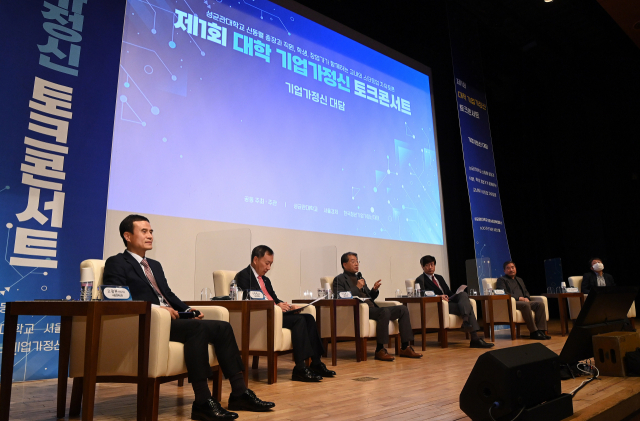To some, a start-up company may represent success, as numerous projects are implemented to support start-ups, especially policies that aid undergraduate entrepreneurs. However, the low success rates of undergraduate start-ups and abuse of support packages have been causing problems. Therefore, the Sungkyun Times (SKT) will analyze the background and issues of student start-up companies, as well as suggest solutions to current start-ups to become sustainable businesses.
Advent of the Student Start-up Boom
Second Start-up Boom
A start-up refers to a newly established company with innovative technologies and ideas. The student startup boom has become a new trend starting in 2020. The first start-up boom occurred with the development of information and communication technologies in the 2000s. Since then, start-ups have survived longer, marked higher sales growth rates than existing companies, and positively impacted employment rates. The second start-up boom, which started 20 years after the first start-up boom, began with an enormous scale of investment and support for startups; the government, especially, emphasized start-ups as a new motivation for economic growth. According to the Ministry of Small and Medium Enterprises and Startups (MSS), the second start-up boom created 36,000 companies, more than four times the number of the companies established during the first boom. Notably, since the fourth industrial revolution, values such as connection, convergence, and innovation have become some of the primary pillars to lead the future. As a result, creative ideas by the young, specifically undergraduate students, have become the core to driving change. As the number of students launching start-ups and supportive measures for such students increases, more networks and platforms are being formed, creating a more favorable environment.

Lowered Entry Barriers to Start a Business
With the start of the second start-up boom, the negative perception of starting a business has also changed. While people used to regard start-ups as a shortcut to failure in the past, nowadays, many undergraduate entrepreneurs start a business and enter the market actively if they have a new idea. Furthermore, various policy funds and packages, as well as the increased budget for supporting start-ups in 2002, have lowered the pressure to start a business. According to the MSS, more than $3 billion was allocated for start-up supporting projects such as commercialization, mentoring, and education in 2022, compared to the $1.2 billion in 2021. As such, the government and universities are trying to support undergraduate entrepreneurs to start businesses. Especial ly at Sungkyunkwan University (SKKU), the LINC+ project and the Start-up Business Support Platform exist for undergraduate entrepreneurs. The LINC+ project at SKKU conducts diverse start-up education programs. They operate start-up clubs that provide customized education to prospective start-up entrepreneur students and support consultation with professors and experts in related industries.
Problems with Student Start-ups
Limits to Actualizing Ideas
Even though student entrepreneurs are full of ideas, they face several difficulties such as a lack of funding, the impracticality of their ideas, and being able to manage a business and their studies at the same time. Due to the support funds at the initial stage, there are few burdens in commercializing ideas. However, there is an incredible challenge in preparing additional costs to maintain and expand the business. Nevertheless, while SKKU provides a preliminary start-up package, it does not support startups after the first three years, which tends to be the most critical and difficult time for managers. It is also challenging to actualize ideas that used to seem brilliant before starting the business. If student entrepreneurs do not conduct thorough market research, they may struggle with real-world applications. Furthermore, as most student entrepreneurs that start their first business lack experience, their plans tend to be too faulty to enter the market. Even if they succeed in penetrating the market, simultaneously managing a business and academics can be very demanding. For example, although leaves-of-absence and subject curriculums organized for student entrepreneurs exist in SKKU, only 26 Kingos used the system in 2019. In addition, though it takes approximately three years to stabilize a start-up business, the maximum period of leave of absence is only two years, which is rather inefficient.

Business Experiences for Job-Hunting
Although the process of launching a start-up has become less complex, some students still find it hard to maintain businesses. In such cases, the start-ups are reduced to experiences that those students use to beef up their resumes. Moreover, some even deliberately abuse the startup experience for job-hunting. According to Statistics Korea, in 2019, there were 1,411 companies in colleges, but only 334 companies created sales, which is only 23%. Even though producing sales is essential to sustain a business, this is not always possible, as student start-ups rarely enter the real market. If there are no subsidies to cover expenses, companies with adverse sales outcomes cannot be maintained. Also, several students abuse the start-up experience only for their employment, as employers nowadays prefer job candidates with start-up experiences. Start-ups that are established only for job hunting do not use the budget adequately and deteriorate the quality of the entire start-up market. As a result, there is rising criticism regarding the support measures of the government and universities. Although they may support enough costs to maybe create a prototype, deficient support for production or distribution makes student start-ups suffer. Moreover, many argue that as the number of students who abuse the support policies increases, the policies should focus on medium and long-term stages rather than the initial stages of start-ups.
Improvements for Constructive Student Start-ups
Start-ups with a Clear Purpose and Preparation
Starting a business with vague ideas is most likely to lead to failure. The entrepreneur should have done thorough market research, secured sales channels, formed a brand image, and investigated target markets beforehand. Kingos can also utilize SKKU’s “3S-Program,” which supports undergraduate founders. The 3S-Program consists of “Start,” a process that discovers candidates for undergraduate start-ups, “Support,” a method that educates various start-ups and supports participation in domestic and foreign start-up contests, and “Success,” a process that supports practical and independent startups.
Eom Su-jeong, leader of the Start-up Education Center at SKKU’s LINC+ project, said, “We recommend Kingos to gain experience through better use of SKKU’s program that supports start-up clubs. Then, they can apply those experiences to other programs provided by both the school and government to establish start-ups.” In addition, a lack of experience and professionalism are the main weaknesses of undergraduate entrepreneurs, so undergraduates need to receive continuous education. In the first half of 2022, SKKU’s start-up education center will open the “Erline Campus,” a joint start-up education platform with 18 universities, which include Kyung Hee University and Dongguk University. It offers free educational content specialized to each university to help develop undergraduate entrepreneurship.
Improvements for the Quality of Start-up Support Projects
Since a lack of funding is the biggest problem for student entrepreneurs, universities and the government should support start-ups with high growth potential through enhanced screening and phased support. For instance, SKKU needs to set up additional support packages for startups after three years, which is a leap period. The school system for student founders also needs to be improved. Considering that expanding a business takes a long time, and as there is a heavy workload in the first three years, the period for leaves-of-absence should be extended. Another way is to investigate the demand for specific subjects and set up new courses in the challenging semester so that student founders can strengthen their abilities. Moreover, start-up support agencies should reward start-ups’ early entry into the market. Since it is hard to secure trust from customers at the beginning of a business, support agencies should guarantee the start-up’s initial transactions and distribution channels with clients.
The second start-up boom has emerged as a new issue in our society. However, one brilliant idea cannot guarantee success. Systematic examination is key to expanding the start-up boom even further. Government and university support systems should also be improved. The wave of innovation will only thrive when qualitative efforts are made to enhance student entrepreneurs’ inconvenience.
